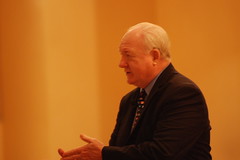 Image via Wikipedia
When Worlds Collide!
How crisis communication theory meets crisis communication reality
Image via Wikipedia
When Worlds Collide!
How crisis communication theory meets crisis communication reality
Guest post by
Brad Domitrovich, PR Zealot
What is a crisis? By definition, it is a crucial or decisive situation, a turning point. For those of us who happen to be in the school PR business, a crisis is better defined as any event that causes us to stop what we are doing and react. From a personal standpoint, I define a crisis as any situation that makes me reach into my medicine cabinet and grab my favorite bottle of headache relief!
Over the past year, I’ve presented crisis communication seminars at several conferences across Texas. In attendance at these workshops were School Board Trustees, Superintendents, District Level Administrators, and Campus Level Administrators. It is always such a breeze lecturing people about what to do in a crisis, especially when there isn’t one going on at that very moment. It sure is easy being “the expert” on stage answering questions about managing the media when there isn’t a line of reporters at my door. Life is so easy when you’re operating in “theory” mode rather than “reality” mode. I’m a big fan of the show Seinfeld. So what happens when, as the character
George Costanza states, “worlds collide?”
What happens when reality is here and theory takes a back seat?
Every school district has to deal with a crisis from time to time. The ones I have worked for are no exceptions. A couple of months ago, I had a crisis situation pop up. A big one. One of those that you know that within the next twenty-four hours, you are going to be contacted by virtually every media outlet in your market.
Instead of getting myself worked up into frenzy mode, I opted to close my office door, sit in the quiet for a few minutes, and jot down some notes as a plan of action. When I finished penning my last bullet point, I realized that what I was jotting down, was a parroting of what I have been presenting as “theory” throughout the past year.
#1: Be prepared
Although each crisis is different and should be weighed on its own merit, preparation is paramount. What does being prepared mean? Being prepared for me in this case was reviewing information with key individuals. I made sure that I had all the details I needed so I knew what to say. There is no such thing as having too much information when you are preparing for a media blitz. I reviewed timelines, activities, and actions and made sure that all of us knew what to do and what to say during and after the crisis period. Bradley D. Smith, School Board President for Georgetown ISD reiterates this thought. “My advice to administrators would be to completely understand the facts regarding the crisis and then articulate a strong strategy,” he states.
#2: Never say “no comment”
Everyone knows that
you should never say no comment. I always try to view the crisis from the eye of the public. Do they want to hear you say “no comment”? Anytime you ignore a crisis situation, it only makes things worse. If we provided no comment, we would have lost our greatest opportunity to control the crisis.
#3: Have one spokesperson
Having one spokesperson who is comfortable in front of reporters is an incredible asset in a crisis situation. One individual should always be designated as the primary spokesperson to make official statements and represent the company. A back-up individual should also be identified in the event the primary person is unavailable. “Have a predetermined spokesperson to handle all the information releases and interviews,” explains
Craig Verley, Public Relations Director for Mission Consolidated ISD. “One voice with correct and timely info – frees up other staff to do their jobs in dealing with the emergency situation without media distractions,” he adds.
#4: Media relations is critical
The best time to build a relationship with the media is when you don’t have a major issue in the spotlight. Stay current with reporter names, phone numbers and e-mail addresses. Be proactive. Don’t wait for bad news to begin developing relationships. Mansfield ISD’s Director of Media and Communications Richie Escovedo tells us to “establish positive relationships with the media, community, and advocates before you need them.”
#5: Bleed for a day, not a week
It is always good practice to confront the situation immediately and take charge. If you’re hoping that the radar doesn’t find you because you’re lying low, that just doesn’t work. Embracing the crisis, being prepared, and having a statement ready allows you to get on with business as usual after only one day of controlled chaos.
So those were the five bullet points I jotted down. As I look back, worlds can collide! Managing a crisis can be accomplished as long as you allow “reality” to meet with “theory.”
------
Brad Domitrovich is a “PR Zealot” with over thirty years of experience in the academic, entrepreneurial, and corporate environment. He is Past President of the Texas School Public Relations Association and served for six years on the TSPRA Executive Committee. Brad is invited frequently to speak at conferences sponsored by a number of educational organizations. He has delivered keynotes and presentations for several school districts and Educational Service Centers throughout Texas. Currently, Brad is the Director of School and Community Relations for the Georgetown Independent School District. He can be contacted at Brad@Domitrovich.com or (830) 688-9912.




































